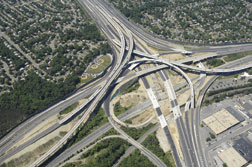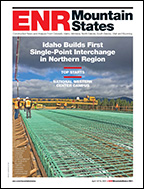 Archer Western Reconstruction of Virginia "Mixing Bowl" is finally wrapping up. |
Graham Myers, project manager with Bechtel Infrastructure Corp., is enjoying the silence in the Virginia media's traffic reports of the once-notorious Springfield Interchange. The $675-million improvement to the interchange, which links Interstates 95, 495 and 395 in northern Virginia, officially wrapped up June 30. It took more than a decade of work to improve the infamous bottleneck known locally as the "Mixing Bowl."
Bechtel, in a project management joint venture with Dewberry, Fairfax, Va., has witnessed a significant turnaround at the seven-phase project over the years (ENR 5/6/02 p. 46). Long subjected to heavy scrutiny for cost escalations and delays, the project faced a last crucial hurdle two years ago. Archer Western Contractors, Sandston, Va., faced possible default termination due to delays on phases six and seven. But the firm wrapped up work last month slightly ahead of schedule and is now positioned to receive an incentive bonus of almost $3 million. "This has been the most difficult and frustrating job I've worked on, which makes it all the more rewarding to see where we are now," says John Waugh, Archer Western project manager.
The firm's $113-million contract, awarded in 2003, included 14 new bridges, seven miles of new roadways and ramps, demolition of pre-existing bridges, mechanically stabilized earth walls, utilities, drainage and signage. It built several major flyovers, including a 1-kilometer-long bridge that links northbound Interstate 95 to I-495 North. The steel-girder bridge, which is 72 ft wide at the I-95 approach and 60 ft wide at the merge onto I-495, soars up to 110 ft above ground.
When Archer Western successfully bid in 2003, it stepped into a project that had already been criticized for significant cost escalations. Estimates in 1994, when design was 40% complete, were pegged at $350 million. When construction began in 1999, total costs were estimated at $438 million, but those figures soared by more than 50% by 2002.
At the time, steel prices were spiking. The Virginia Dept. of Transportation also was under increasing pressure as state transportation funds shrank. Shortly after the firm broke ground in 2004, the project began to lag. VDOT recognized Archer Western's concerns about steel, but publicly denounced the company for lax management.
Charlie Warraich, VDOT assistant project manager, says Archer Western was a "slow starter," but added that the two parties came to an agreement on a recovery schedule. "We gave it another shot," he says. "In April 2005, they started to show that they would miss some of the milestones, and that's when we got serious."
Archer Western brought in additional resources, including Waugh and senior operations manager Bernie Conway. Conway says the project was nearly two months behind the official schedule when he came on board. "We have some pending extensions that have yet to be resolved," he says. "According to the schedule we were behind, but in our opinion, we were not."
After considerable hand-wringing, compromises and overtime, VDOT and Archer Western created a plan to get the project back on track. Weekend closures, which were not allowed under the original contract, became an option, and soon the project evolved into a 24/7 operation. Archer Western culled staff from other mid-Atlantic projects and maxed out at nearly 150 hourly employees. "We knew we were behind the eight ball and that we weren't going to get the extensions we needed," Waugh recalls. "Regardless of that, we were determined to get this done on time."
VDOT and Archer Western agreed to a settlement that would award the contractor $943,000 for completing the project by July 1, or 18 days before the scheduled date. If they met that goal, Archer Western would also be eligible for nearly $2.8 million to help offset steel escalations.
Bechtel also used Six Sigma practices to identify weaknesses in the process. Resulting changes included reducing turnaround in the RFI process from a maximum of 30 days to five days. "We started resolving issues very quickly," Warraich says. "We'd turn things around in one or two days."
Even with around-the-clock schedules, time was tight. On many nighttime projects, the team had to adhere to schedules laid out in 10- to 15-minute intervals established by VDOT. Crews could close lanes on weekday nights for eight hours, reopening no later than 5 a.m. On a few occasions, VDOT cited the team for opening five minutes late, Waugh says. Lanes could be closed for up to 12 hours on Friday nights and 13 hours on Saturday nights.
Work on the 1-km-long flyover bridge, which crosses three major roadways, required clockwork precision. The team had to erect, then tie a pair of girders together so as not to create a suspended load. Last August, the largest pieces-two curved 150-ft-long, 57.5-ton girders-were placed using two crawler cranes. After securing a pair of girders, the team could then work on a single girder per night during the week until the span was completed.
Crews caught a break in January while placing bridge decks, when temperatures hit unseasonably high levels. But temperatures dropped below freezing again by February, and crews used space heaters to keep work moving.
Moving manpower and machines around the congested site, which sees nearly 430,000 vehicles per day, was a challenge. Space also was at a premium, forcing crews to close lanes and take down guardrail to assemble cranes. Archer Western also recycled material by pulverizing it and using it throughout the project, rather than shipping it offsite.
Conway and Waugh, both veterans of Boston's Central Artery/Tunnel project, say the nearly two-year turnaround on the Springfield Interchange was the most difficult challenge they've encountered. "It wasn't an engineering challenge as much as it was a logistical nightmare due to the volume of traffic that flows through the interchange," says Conway. "[That was] due to the restrictions and notification requirements for lane closures and due to the steel issues."
The team is hopeful that its final completion documents will be accepted by the state so it can receive its $2.8-million bonus, but lingering issues remain. Archer Western faces nearly $5 million in penalties for missing multiple milestones on the job. Those claims are currently being reviewed by the dispute resolution board. "We're not quite there yet," Conway says. "I have a feeling we'll be dealing with this for a period of time to come."


Post a comment to this article
Report Abusive Comment